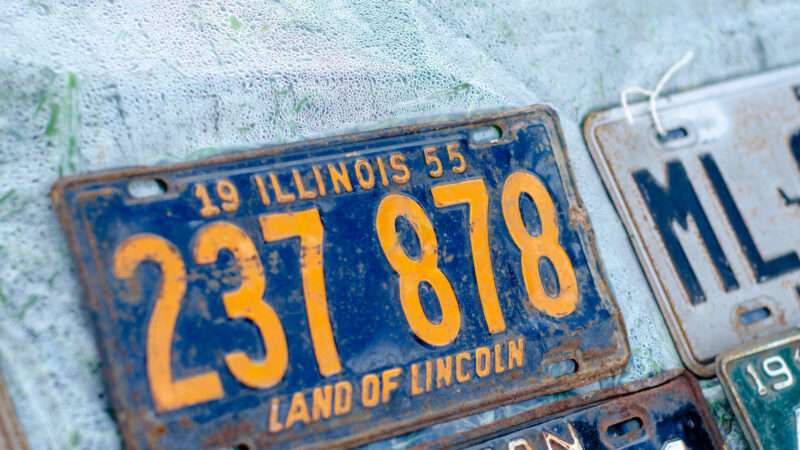
Can state police track drivers everywhere they go via hundreds of license plate cameras? A new lawsuit says that Illinois' widespread use of such cameras—called automatic license plate readers (ALPRs)—violates the Fourth Amendment's prohibition against unreasonable searches because it breaches citizens' reasonable expectations of privacy.
The complaint—filed by two residents of Cook County, Stephanie Scholl and Frank Bednarz, in the U.S. District Court for the Northern District of Illinois on May 30—names the Illinois State Police (ISP), ISP Director Brendan F. Kelly, Illinois Attorney General Kwame Raoul, and Gov. J.B. Pritzker as the defendants.
"Defendants are tracking anyone who drives to work in Cook County—or to school, or a grocery store, or a doctor's office, or a pharmacy, or a political rally, or a romantic encounter, or family gathering—every day," the lawsuit states, "without any reason to suspect anyone of anything, and are holding onto those whereabouts just in case they decide in the future that some citizen might be an appropriate target of law enforcement."
Illinois' highway camera network began in 2019 with the passage of the Tamara Clayton Expressway Camera Act, named for a postal worker who was shot and killed on an interstate highway south of Chicago. The act directed the state police to "increase the amount of cameras along expressways and the State highway system."
Illinois State Police received a $12.5 million state grant in 2021 to install cameras, which was more than doubled in June 2022 when Pritzker extended the act, granting up to $20 million in additional funding. As of publishing time, the Illinois Department of Transportation has purchased 652 license plate cameras, of which 340 are installed in Cook County, which includes Chicago.
According to the ISP's dashboard, in the past month, the system has recorded over 215 million "detections" (when a camera captures a digital image of a license plate) and over 1. 4 million "hits" (when a captured license plate matches a plate on the state police's "Hot List," which includes the license plate numbers of stolen vehicles and wanted subjects). Annually, the system records over 1.5 billion detections—more than 100 times the state's population.
Readings from the cameras are stored by ISP for 90 days.
But where law enforcement sees a more effective way to catch criminals, some legal experts see a potential violation of privacy—and, by proxy, of citizens' Fourth Amendment rights.
Since the Supreme Court's 1967 decision in Katz v. United States, searches that infringe upon "reasonable expectations of privacy" have been held to violate the Fourth Amendment, with some limited exceptions. This recent lawsuit argues that citizens have a reasonable expectation of privacy in the "aggregation" of their location data—that is, in the summation of their movements.
"I think it's fair to say this is a new area of law where there are very few cases and rules are still being written," Reilly Stephens, counsel for the Liberty Justice Center, which is representing the plaintiffs, tells Reason. "We want to be a part of shaping what those legal rules are going to be."
The most analogous case is Commonwealth v. McCarthy (2020), which was the first appellate court case to address the interplay between license plate cameras and the Fourth Amendment.
In McCarthy, the Massachusetts Supreme Judicial Court denied defendant Jason McCarthy's motion to suppress ALPR evidence but held that McCarthy's challenge was potentially viable, providing that the license plate tracking was sufficiently comprehensive. "With enough cameras in enough locations," the court decided, "the historic location data from an ALPR system in Massachusetts would invade a reasonable expectation of privacy and would constitute a search for constitutional purposes."
McCarthy was only tracked by two license plate cameras—on the two bridges that serve as the entryway to Cape Cod—which would have given police only a limited picture of his whereabouts. In Illinois, there are over 600 such cameras, located all across the state.
For that reason, the Liberty Justice Center believes the Illinois complaint could fare better than McCarthy's. "We intend to give the Court in our case what the Massachusetts Supreme Court wanted but didn't have: evidence that the given system of ALPRs is so pervasive as to generate a sufficiently comprehensive record of citizen's movements," Stephens tells Reason.
As tracking measures become increasingly common and cost-effective, courts will need a bright line to distinguish allowable public surveillance from that which infringes upon citizens' privacy expectations. If there were license plate readers on every street, that would very likely violate legitimate expectations of privacy. In Massachusetts, that state's highest court said the system of two ALPRs did not. What distinguishes the two? Where should courts draw the line?
"The case is an important one because it could help to clarify and strengthen the scope of Fourth Amendment rights against increasingly ubiquitous and unavoidable government surveillance," Jonathan Manes, senior counsel at the MacArthur Justice Center, tells Reason about the Illinois lawsuit. "This case seeks to ensure that advances in police technology do not leave the Fourth Amendment in the dust."
The post Illinois License Plate Cameras Are Violating People's Constitutional Rights, Says New Suit appeared first on Reason.com.







